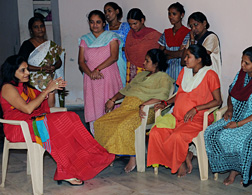Caste still an important factor in IVF in India
Ancient system remains relevant, especially in IVF
Cutting-edge
medical treatments clash with age-old caste divisions in India’s booming
fertility industry, as parents seek donors from the same caste and religion.
“Couples
are very particular about the caste hierarchy of the prospective mother or even
the surrogate carrier,” said Ramana Rao, an agent in India’s southwestern port
city of Vishakhapatnam. Rao hires egg donors and surrogates for childless
couples and fertility clinics in cities such as Bangalore, Hyderabad and
Chennai.
In
the West, medical fitness is frequently a key factor in choosing egg donors,
but in India, the family will only do medical checks once they are convinced
about the caste background of the donor or surrogate. The ancient caste system
has traditionally been India’s way of denoting a person’s social status, with the
Brahmins at the top and the Dalit untouchables on the bottom.
India’s
constitution prohibits caste and community discrimination, and the younger
generation of urban Indians in general are less concerned about the old social
order – but not in fertility clinics.
“Alongside
looks, skin color and height and education, prospective couples look for egg
donors of the same caste and religion,” said Samit Sekhar, an assisted
reproduction specialist in the eastern city of Hyderaba.
Sociologist
Carol Upadhya at Bangalore’s National Institute of Advanced Studies says that
among many Indians, caste is perceived as that which preserves racial purity.
“They feel caste is rooted in the body, in the genetic material,” she said.
The
educated classes also seek specific genes because they want to pass caste and
community genes to future generations, Rao said. “Prospective parents openly
advertise for egg donors and surrogates by caste in the classified sections of
local newspapers,” he said. ~ The Global Post, Sept 21
jared Yee
India
surrogacy
- How long can you put off seeing the doctor because of lockdowns? - December 3, 2021
- House of Lords debates assisted suicide—again - October 28, 2021
- Spanish government tries to restrict conscientious objection - October 28, 2021
